How tradespeople can level up their construction businesses in 2021
Four knowledgeable people in the construction industry share trends and opportunities that tradespeople should jump on in 2021.
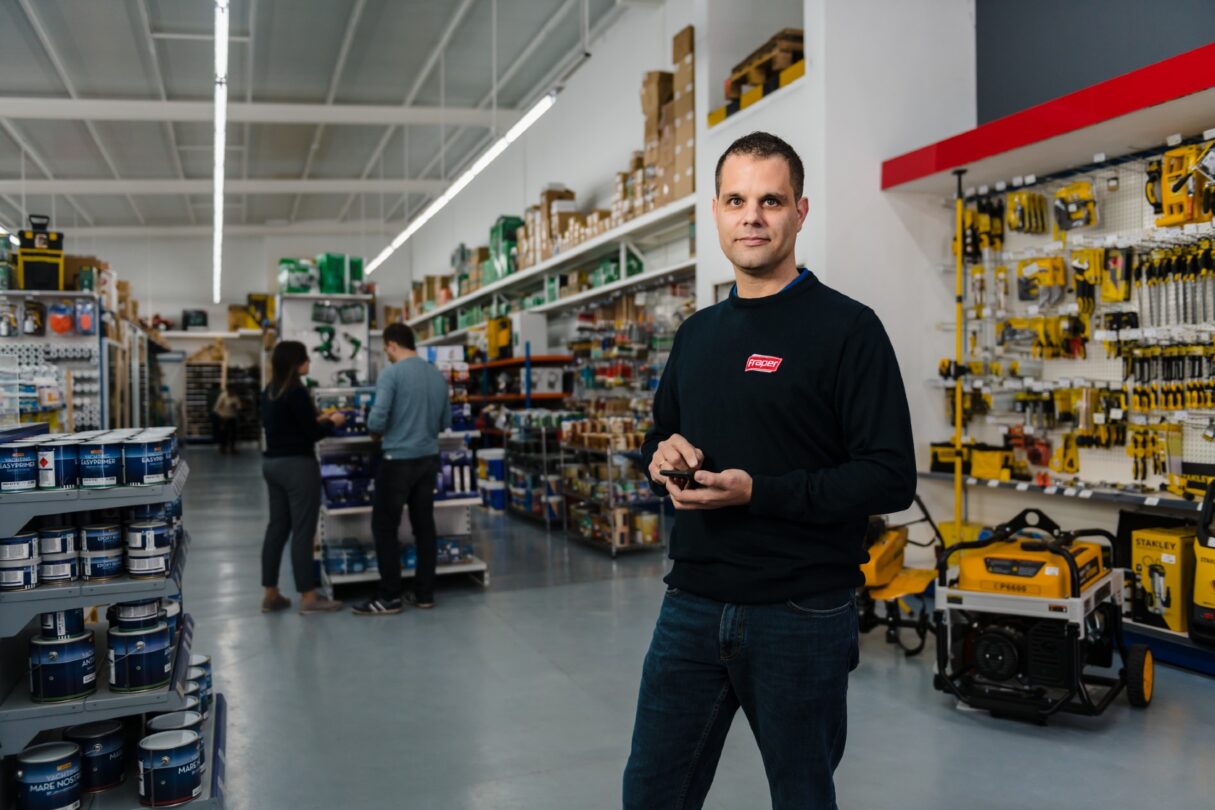
The construction industry is constantly evolving and changing, with new trends and ways of doing things popping up all the time.
So, what’s never coming back?
What’s here to stay?
And what’s about to be big?
To get some of the answers, we’ve asked some extremely knowledgeable people in the industry to share trends and opportunities that tradespeople should be jumping on in 2021.
Here’s what we cover in this article:
Where the construction industry’s going
Top tips from Michelle Hands to ensure the post pandemic environment works for you
Top tips to level up your construction business in 2021
Meet out industry experts
Before we dive into the good stuff, let’s introduce you to our four construction experts. They’ve got lots of industry knowledge and their advice is invaluable.
Here’s a bit more about them…
Fat Sam
Sam has been a self-employed sparky for 15 years, working on major projects in and around London and specialising in the industrial sector.
He’s also the host of the UK’s number one podcast for electricians, Electricians Monday Club, where they discuss all things sparking.
Jordan Farley
Jordan is an electrician and entrepreneur who founded Artisan Electrics in 2016. He’s created a fast-growing YouTube channel where he shares his work on the life of an electrician and his team.
He also runs an online business training course for people who want to start up on their own and grow a successful trades business from scratch.
Mark Allison
With nearly 25 years in the industry and more than 15 years as a small business owner, Mark now leads a small team of time served electricians providing electrical services across the UK.
He’s determined to encourage apprentice-based training, which is why he founded Apprentice 121. It’s helped 800 people get back into work in the electrical industry during the coronavirus pandemic.
Michelle Hands
With more than 12 years of construction industry experience, Michelle is passionate about giving a “refreshingly honest account” of what life is like on-site. She wants to help inspire the next generation and provoke thought as to why the industry still suffers from such low rates of women on site.
In 2020, Michelle’s pregnancy gained international media attention, portraying the message that women really can do it all after she released a picture of her “building two things, at once”.
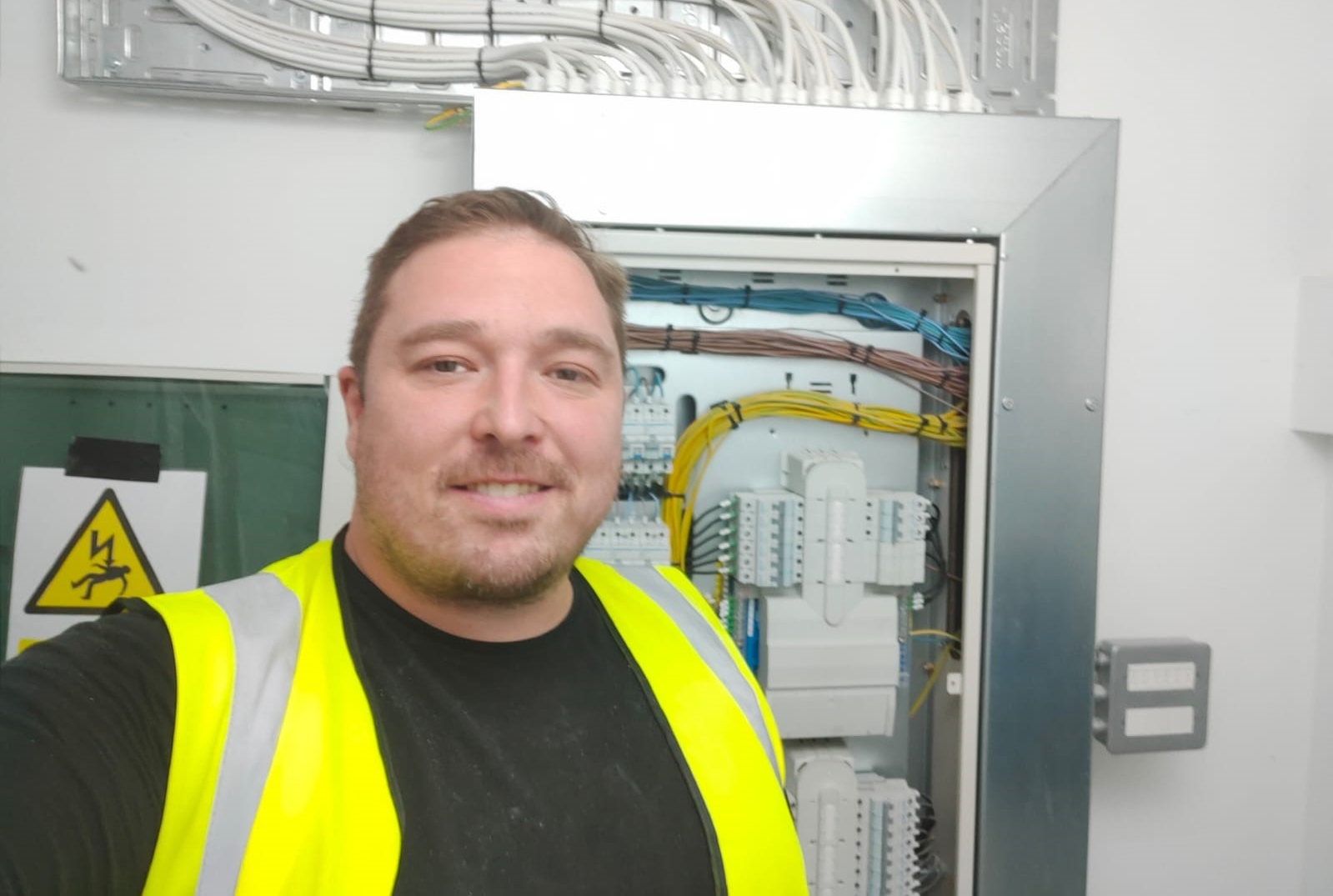
Fat Sam’s the host of Electricians Monday Club, a podcast for electricians
Where the construction industry’s going
Fat Sam:
When I was 10, I read a book that said we were in the digital age. They couldn’t have been more wrong.
We’re just entering into that now really aren’t we? Everything is going digital.
One of the things happening in the electrical industry is that it was once quite basic. We were running a cable from point A to point B, yes there’s a lot that goes into that.
But now the remit is expanding quite substantially to include smart tech and having an understanding of the software behind the smart tech.
I really think smart tech and renewables, that’s what’s going to be big in 2021 and beyond.
That’s where the electrical industry is going.
For me, it’s quite exciting. I feel like we’re living in the future and we don’t really realise it yet.
Jordan Farley:
It’s all about predicting future trends.
To do this, I like to look at what’s going on in the industry magazines. They talk about upcoming trends in the market. And they’re pretty spot-on when it comes to upcoming things in the electrical industry.
A couple of years ago, they were already talking about electric vehicle charging becoming a trend – and look what’s happened?
Streamlining business
Mark Allison:
As we move out of the coronavirus pandemic (hopefully!), trades people are going to have to be more resilient than ever before.
Time management will be critical to get the maximum value from productive work hours.
Streamlining business processes will be critical, from initial customer enquiry all the way through to customer invoicing and receiving payments.
Automation of the back end
Fat Sam:
Speaking to a few people over the past year or so, we’re starting to see that this automation of the back end is becoming a very real thing for tradespeople.
No longer is it just a triplicate receipt, where you get one, your accountant gets one, and one goes in your books.
That’s old hat now.
And we’re talking about streamlining that process and all these little things like throwing receipts in a folder, you don’t have to do anymore.
The whole thing is streamlined and it gives you a complete 360-degree picture of everything that goes on.
It’s all about automating the back end of your business, so you can spend more time in control of the smaller things and concentrate on building quality.
Mark Allison:
In my specific industry, we have a huge opportunity for electricians in the electric vehicle charging marketplace.
This involves a lot of data collection, accounting of grants and allocating payments to high value projects.
Sage is helping us achieve this and more every single day in our business. It’s so important to prepare for an increase in work demand by investing in software to free up more of your time. Along with holding stronger records of completed work tasks.
Utilising the seamless link up of CRM (customer relationship management) and accounting packages is a journey we’ve seen huge benefits from in 2021 already.
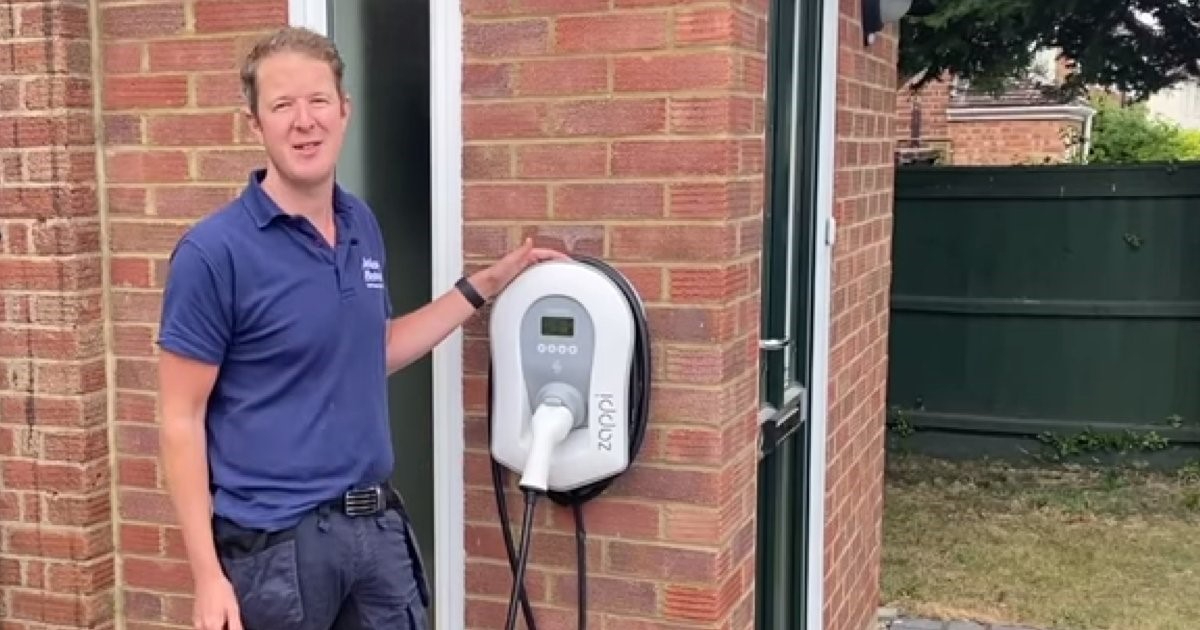
Jordan’s created a YouTube channel where he shares his work on the life of an electrician
Electric vehicles
Jordan Farley:
We’re doing tons of electric vehicle (EV) charging jobs at the moment.
That’s one massive trend that has enabled our business to grow exponentially over the past year because we got in early, we upskilled, we got qualified and then we started marketing ourselves as experts in that niche.
If you haven’t done so already, and you’re an electrician who wants to level up your business and be successful, you really need to jump on the EV charging trend, and get ready for the massive amount of work that could come your way within the electric vehicle charging space.
With electric vehicles becoming so popular now, what people want is an ecosystem where they can take the sunshine that is shining on to their roof, turn it into electricity, store that electricity in a battery, and then use it to charge their electric vehicle overnight, so they’re essentially driving their car on full sunshine.
This is going to be huge.
Eventually, most houses will have solar panels on and most houses will have a battery, and the whole way we use energy is going to change.

Mark founded Apprentice 121, which helped 800 people get back into work in the electrical industry during the pandemic
Domestic work and smart homes
Mark Allison:
A trend we’ve noticed is a big increase in work within domestic property along with a decrease in commercial projects.
Which makes a lot of sense considering the past 12 to 18 months.
However, once things return to normal, lots of pent-up demand would be expected in the commercial marketplace.
Jordan Farley:
Another trend that’s growing is smart home technology. It’s become the way forward with new builds.
People want to be able to control everything from their phone or computer. They want everything automated and tied in together to a system that works.
So, if you are looking to develop and grow your business over the next year, you really want to get into smart home technology too.
Solar and battery storage
Jordan Farley:
Solar and battery storage is a niche that Artisan Electricians is getting on board with in the next couple of weeks.
My business partner and I are going on the solar course, so we can become qualified installers of solar systems.
So many people are interested in renewable energy now. People are becoming aware of the fact that we need to do more to have sustainable energy systems.
What’s gone for good?
Mark Allison:
I would say you’re looking at some of the more traditional skills, such as pyro work. A lot of that has been replaced with modern equipment and materials.
It doesn’t seem to get installed as much as it used to.
As a result, traditional apprenticeships in the industry are changing as smart tech evolves, and certain stills are made redundant and are being lost.
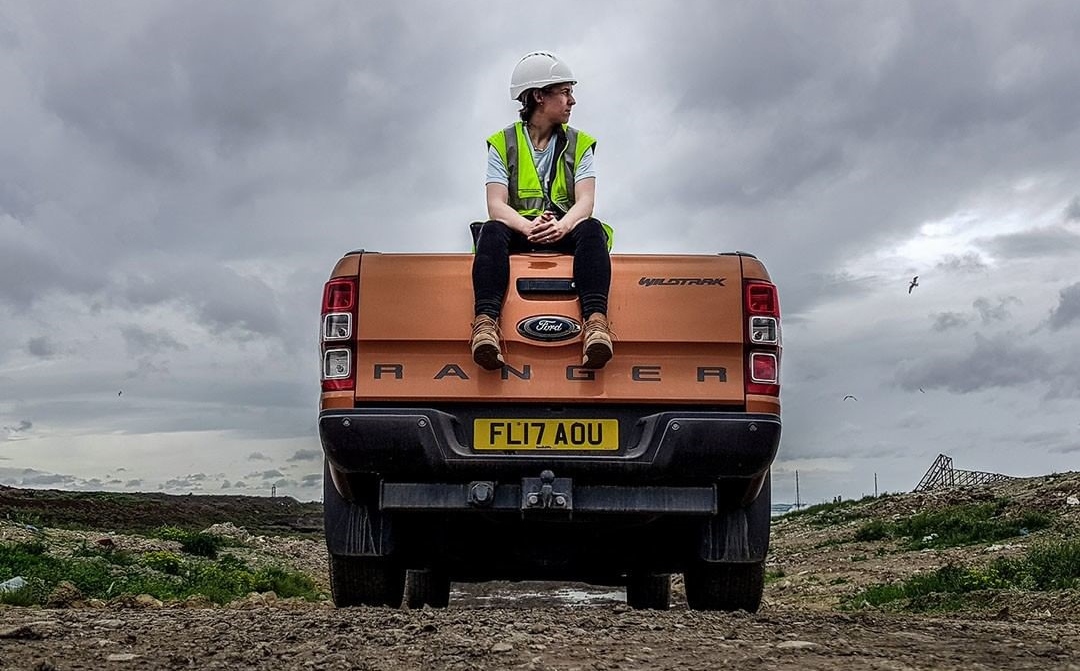
Michelle wants provoke thought as to why the industry still suffers from such low rates of women on site
Top tips from Michelle Hands to ensure the post pandemic environment works for you
Work from home
It’s something I believe you really should take advantage of.
Especially if you have kids that need taking or picking up from school, or if you want to go to the gym in the morning, or if you prefer to leave your paperwork until later in the evening.
Traditionally in construction, this has been a bit rigid with times on-site. But I’ve seen this changing a bit.
If flexible working is offered to you, you should take it.
Move jobs
If you’ve been stuck in a job and feel pretty stagnant, why not use the opportunity now in 2021 with things changing and new projects kicking off to move jobs, find that perfect job that you’ve always wanted to do?
The trade and construction industry is booming right now and there is a distinct lack of labour, skills and managers, so make the shift.
Don’t ignore technology
I’ve spent a bit of time over the past year upgrading my skills, such as computer and CAD (computer aided design) skills. This is the perfect time to look at how your skills relate to your job and upskill.
Take advantage of a booming industry
Take a look at the average rates, and if you haven’t already, increase your rates so they match that standard.
You don’t want to be leaving money on the table.
Start building back relationships
We do everything on our phones, but really the one thing I love about the construction industry is the human touch, the ability to talk to work colleagues face-to-face.
Top tips to level up your construction business in 2021
Social media
Everyone these days is on TikTok, Facebook, Instagram, LinkedIn and YouTube. Get involved. Share your story, share the work you’re doing.
Plan your future
Nobody saw the pandemic coming, but everyone had a panic when we all got told to stop working. So, put some money aside if you can.
Look to the future and be ready in case something similar is to happen again.
Keep up to date
If you’re anything like me, I let things slide during the last year while I wasn’t working. When I came back to work I wasn’t really that ready.
I had done a few online courses, but I could have done a lot more.
So go ahead and educate yourself and get ahead of the crowd.
Streamline your workflow
Write a to-do list. Every time I come to work in the morning, I write a list of eight to 10 tasks I would like to get done in that day.
Health and wellbeing
Make sure your health and mental health is at the forefront of everything you do.
Manage processes effectively
Purchase an accounting software package aimed at the construction and trades industry.
If you’re finding yourself too bogged down in numbers, you can let the software do it for you, so you can spend more time doing what you do best.
The mobile apps that come with these also really help to manage your admin even when you’re on-site.
Final thoughts
So there we have it. Some pretty good insights into the industry, as well as some fantastic advice on how to really level up your business.
From electric vehicle charging, to smart homes, a lot is changing in the industry.
So it’s even more important in the current environment to keep on top of trends and ahead of the industry curve to give yourself that competitive advantage.
One of the best ways to free up time to do the necessary big-picture thinking is to take your administrative processes digital.
That will help you to reduce admin so you can focus on levelling up.
Taking the confusion out of construction accounting
Is the challenge of sorting your construction accounting holding your back? This free guide will help to simplify things so you can stay on top of managing your business admin.
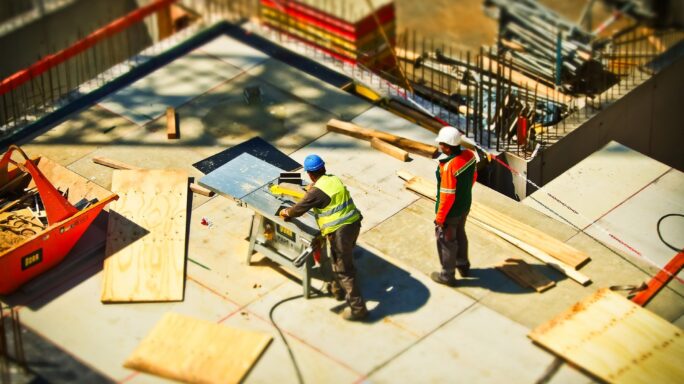






Ask the author a question or share your advice